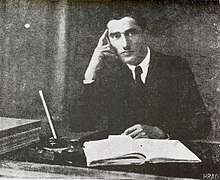Nuri Dersimi
Mehmet Nuri Dersimi (born 1893 in Akzunik in Dersim, today Tunceli; died 22 August 1973 in Aleppo) was a Kurdish writer, revolutionary and intellectual.

Dersimi was born in March 1893 in the village Akzunik to the west of Hozat, in the Sanjak Dersim.[1] From 1899 he went to primary school in Hozat. After he was sent to the military academy in Elazığ, but he wasn't happy there and asked to come back to his family. So his father decided to move with his family to Harput in 1905, where Dersimi studied in the secondary school. There Dersimi was more comfortable. 1907 the family moved again to Hozat, where Dersimi could stay with his uncle and visit the local boarding school.[2] 1911 he traveled over Trabzon per ship to Istanbul and began to study veterinary medicine. There he became a member of the Kurdish student society Hevi-Kürt Talebe Cemiyeti and 1912 he became the secreteary of the Kürdistan Muhibban Cemiyeti.
During the WW I he worked as a military veterinarian in Erzincan.[3][4] In Erzincan he was a witness of the massacres perpetrated on the Armenians. Because of his political activities, in 1916 he was sent to Kangal, in Sivas, where he married his wife Selvi.1917 he returned to Istanbul to finish his studies.
From 1919 to 1921 the Kocgiri rebellion took place, which he was supporting. He opposed the findings of Abdulkadir Ubeydullah and preferred independence to autonomy for the Kurds. In October 1920, he departed from Istanbul and travelled to the region of the Kocgiri tribe in the Erzincan province, where he established several offices for the Society for the Rise of Kurdistan.[5] Mustafa Kemal Atatürk soon was aware of his activities and called Dersimi responsible for the uprising. Following, Dersimi hid with Seyit Riza and taught people to write Kurdish in Latin letters and was a well received notable amongst the Kurdish community. In 1931 the Turkish Government pardoned Dersimi and gave him a farm in Holvenk. But the Turkish authorities still kept searching his house and friends then visited seldomly.
In summer 1937 he decided to flee first to Greece, after to Syria which at the time was under French Mandate. On the 11 September 1937 he crossed into Syria.[6]
He had adopted several children in Syria, one of whom he named after Seyit Riza. His son Seyit Riza had a son as well who was named after his grandfather, Nuri Dersimi.[7]
Publications
Kurdistan Tarihinde Dersim, (Turkish) Köln, 1988, ISBN 978-9756876442[8]
Hatıratım, (Turkish) Dam Yayinlari, ISBN 978-6058626676[9]
References
- KIeser, Hans-Lukas. "Mehmet Nuri Dersimi, ein asylsuchender Kurde": 4. Cite journal requires
|journal=(help) - KIeser, Hans-Lukas. "Mehmet Nuri Dersimi, ein asylsuchender Kurde": 5. Cite journal requires
|journal=(help) - KIeser, Hans-Lukas. "Mehmet Nuri Dersimi, ein asylsuchender Kurde": 7. Cite journal requires
|journal=(help) - "Nuri Dersimi (Dersim, 1893- Alep 1973) | Sciences Po Violence de masse et Résistance - Réseau de recherche". www.sciencespo.fr (in French). Retrieved 2019-09-21.
- Olson, Robert (1989). The Emergence of Kurdish Nationalism and the Sheikh Said Rebellion, 1880–1925. University of Texas Press. p. 28. ISBN 0292776195.
- KIeser, Hans-Lukas. "Mehmet Nuri Dersimi, ein asylsuchender Kurde": 2. Cite journal requires
|journal=(help) - "The Rojava Legacy of Nuri Dêrsimî". ANF News. Retrieved 2019-09-21.
- "Kürdistan Tarihinde Dersim". www.amazon.com. Retrieved 2019-09-22.
- "Hatiratim". www.amazon.com. Retrieved 2019-09-22.